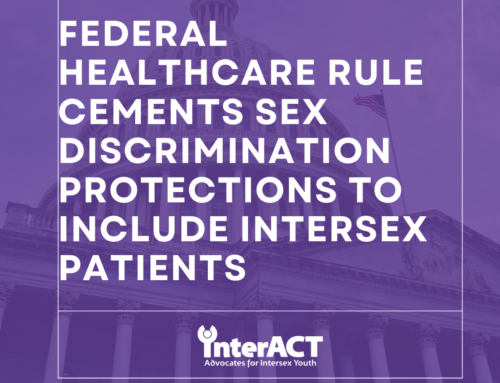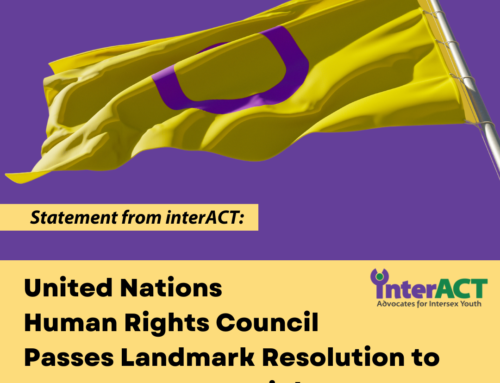interACT: Advocates for Intersex Youth and AIS-DSD Support Group Joint Statement Regarding Requests to Participate in “Defining Successful Outcomes and Trade-Offs”

January 25, 2018
Last month, leadership of interACT: Advocates for Intersex Youth, the nation’s oldest and largest organization dedicated to advancing the human rights of children born with intersex characteristics, and The AIS-DSD Support Group, the nation’s largest support group for individuals and families affected by intersex conditions, were approached by researchers from Phoenix Children’s Hospital and asked to participate in a study referred to as “Defining Successful Outcomes and Trade-Offs.” The design of the study had been finalized prior to our being invited to participate.
Phoenix Children’s Hospital and Cincinnati Children’s Hospital clinicians who were involved in the design of the project have shown their strong support for our community by sponsoring AIS-DSD SG continuing medical education conferences and support group meetings. They are familiar with our efforts to promote community-based participatory research (CBPR), which was designed to protect vulnerable groups. All clinicians involved in the study are aware of decades-long patient advocacy efforts to protect the rights of children born with intersex traits, who are often subjected to controversial, medically unnecessary surgery in infancy that can be safely delayed until the individual can participate in the decision. As acknowledged in the study description, “we’ve learned there is disagreement over what is ‘optimal’ care – or the best ways to achieve the best outcomes. We’re doing a study to learn more about what people think are ‘successful outcomes’ in CARD [conditions affecting reproductive development].”
AIS-DSD SG and interACT are united in the common goal of improving care for those who are born with variations in sex characteristics and their families. It is why, after years of marginalization as research “subjects,” we adopted the philosophy of “nothing about us without us.” In keeping with this philosophy, we promote our inclusion in CBPR. This also enables us to provide input into protections for the vulnerable population with which we work. As the AIS-DSD SG policy explains:
“The AIS-DSD Support Group participates only in studies in which there is an officially recognized community medical consultant from our group. This qualified individual would be involved from the project’s inception, and will provide input into the goals and design of the study in order to direct researchers towards outcomes that will further understanding of patient-centered care for DSD.”
We prepared these guidelines in part because of researchers’ ongoing omission of intersex voices from projects designed to improve our own care. We believe strongly in our involvement as the ultimate experts on our own well-being. It is why we, and other intersex advocates, were forced to resign from participation in the NIH-funded Translational Research Network (our resignation letter is available here). We hoped initially that TRN, which denied participation to community medical advocates at the study-design stage, would allow meaningful input during the study itself. Instead, our concerns regarding the safety of intersex children were ignored and our support was falsely implied. TRN has never sought to make amends with our community for abusing our trust and wasting our time and energy. With the proposed study, already funded and led by a principal investigator from TRN, again failing to meet the most basic criteria for CBPR, it is clear that the lesson of inclusion has not been learned.
The fundamental questions regarding successful outcomes and acceptable trade-offs in medical care must be crafted by those who live with the consequences of treatment. As a vulnerable health disparity group, we cannot allow ourselves to be bystanders in yet another study that neglects our priority for CBPR. It is for this reason that AIS-DSD SG and interACT decline participation in “Defining Successful Outcomes and Trade-Offs.” We must direct our precious resources toward supporting the efforts of researchers who thoughtfully include our voices from the outset.





